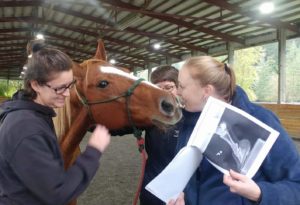 Last September we noticed that Nashville appeared lame during her groundwork sessions. Cantering seemed problematic for her and she had a tough time keeping her leads and not “bunny hopping.” It was concerning considering her son, Valor, had just had surgery to fix his locking stifles.
Last September we noticed that Nashville appeared lame during her groundwork sessions. Cantering seemed problematic for her and she had a tough time keeping her leads and not “bunny hopping.” It was concerning considering her son, Valor, had just had surgery to fix his locking stifles.
A lameness evaluation was performed by Dr. Renner from Rainland. On exam the pain seemed to be originating more from her lumbar area, but it was difficult to pinpoint and therefore difficult to diagnose. He recommended we do a bute trial to see if pain medication would make her sound again. The answer we would get from that trial would give us information about which diagnostic route to proceed with.
A bute trial was performed in October and Nashville seemed greatly improved with the anti-inflammatory medication on board. Using grant money from Pilchuck Veterinary Hospital, we had Dr. Devine perform a recheck on her. She came to a similar conclusion—it seemed to be originating from the lumbar/sacral area and we were looking at a needle-in-a-haystack kind of situation.
At that point we had some decisions to make. We could have a bone scan performed to get a better idea of where the pain was originating, we could begin doing diagnostic nerve blocks, or we could give her some time off and see if she showed any improvement. There were a lot of aspects to think about regarding that decision. The biggest obstacles were the fact that Nashville hadn’t had much prior handling and would not have been gentle enough for nerve blocks, and also that she had never been started under saddle. Spending large sums of money doing diagnostic procedures on a horse that may never be a riding horse is not the best use of funds. We opted to start with the easiest and least expensive route and give her time off, along with some chiropractic adjustments performed by Dr. Meyer of Pilchuck.
Dr. Devine came out last December to evaluate her again, and her lameness seemed improved. She gave us the OK to put her back to work, and we will reassess her lameness again if it reappears. Today Nashville is doing well. There are still some minor concerns and she is not 100%,but the work she’s doing now does not seem to cause her any discomfort. We will continue to get her gentler and started as a riding horse so we can better evaluate any lameness if it returns.

